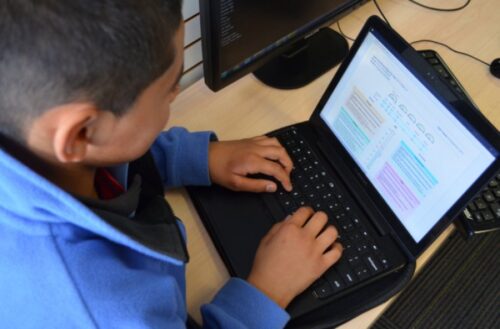Coding for kids
By Editor on October 28, 2014 in Digital fluency
Should all children learn to programme a computer?
I was recently asked if I thought if it was a good idea for all children to learn to code, as in, programme a computer. My answer was yes, although I did point out that I also believe all children need to learn to climb trees, dance, hit a ball, make friends, swim, volunteer, cook, read, … and that it is possible to learn all these things.
Several recent newspaper articles have suggested that all children should learn to code. Some articles called coding the new literacy for the 21st century, others pointed out that we already live in a world dominated by computers and codes that run them and if we want to keep up coding is essential. Some focused on the growing shortage of people who can code, while some showed examples of coding already being taught in New Zealand schools. Several articles suggested we should follow Britain’s lead in making computer programming a compulsory subject in primary schools. In Britain, from the beginning of September 2014, all children will learn to code, starting with five year olds playing games to familiarise themselves with computing concepts through to fourteen year olds learning to code in at least two programming languages.
I am not suggesting children learn to code as a way of preparing all of the next generation to be software engineers and computer programmers but I am suggesting it is a good idea and beneficial to all children regardless of the jobs they end up doing or the technology they’ll be using.
Firstly, the need to code or programme computers is already here. Setting up your new phone and television set or changing the time on your microwave, in one sense, is programming. Phones, TVs, microwaves and computers only work because of the code they contain, and changing any aspect of their working requires a change of code. Coding or programming is simply telling a computer, or thing controlled by a computer, how to perform a task. This includes displaying a time, posting a Facebook update, developing a PowerPoint, finding a route on a map or developing a website or app. In the near future, coding will become simpler and we will need to regularly code to make things work how we want them to, or we will become reliant on others to help us with common daily tasks.
Computers and technology are increasingly becoming more and more part of our lives, whether we like it or not. Homes, cars, work, shopping and leisure activities are likely to rely on technology very soon, if not already. The basic requirements of businesses today include a website, social media presence and a mobile app. It is through coding that we interact with these things. Those who understand this and can code are at a distinct advantage to those who can’t.
If we want to influence or develop something in the future we will be more and more reliant on coding to get this done. All new innovations and recent developments I can think of in any field of endeavour rely heavily, if not solely, on technology and coding. One article talked about the only limit for those who can code is their imagination.
However, the most important reason why I think all children should learn to code is because it would enhance and richly contribute to teaching them to think. “Everybody in this country should learn to program a computer, because it teaches you how to think.” Steve Jobs, Apple Computers.
Thinking in a systematic, organised and logical way is a vital survival skill in today’s world. Learning to code teaches this, along with the ability to break problems into a sequence of smaller manageable steps, sort relevant and irrelevant aspects of a situation, make and test assumptions, and move from specific solutions to general ones. Not every child needs to be able to understand complex computer languages like Java, PHP, Python, Ruby or C++ but everyone needs to learn to think.

In suggesting all children learn to code I am not suggesting we add another subject to our curriculum or have young children in front of computers for long periods. Coding is a tool we need to add to the repertoire of confident, connected, creative, enterprising and active children. Technology and learning to code is part of helping children think, communicate, problem solve, model situations, make things, and prepare them for the changing world they are part of.
It is a powerful thing for a child to plan and build their own website that is accessible to the world or make a mobile app that potentially helps many people or entertains them. Both of these are possible for children, in fact many are already working out how to do it for themselves. It is time for schools to catch up and get on board with what is already happening.
This blog post was written in collaboration with Ian Stevens, former consultant with Evaluation Associates.
Other articles you might like
What is their potential to refocus science education?
Active learners – learners who are able to take ownership of their own learning – are becoming successful lifelong learners.
As educators, we have all heard inspiring stories of the teacher or mentor who changed the direction of a disengaged student.For me, it is the story of Marcus Akuhata-Brown that remains and resonates in my head and heart.
